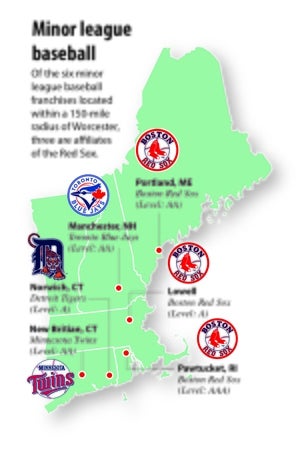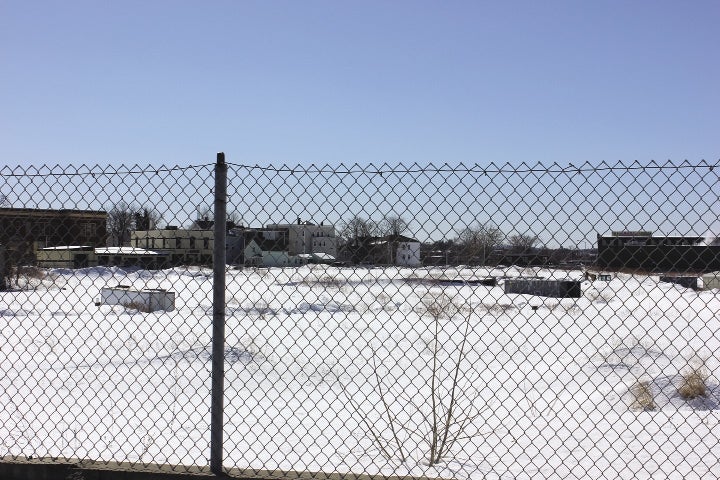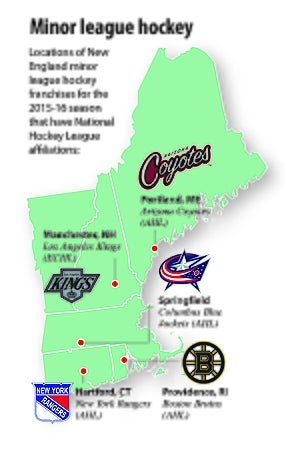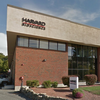Can Worcester boost its stature as destination for minor league sports?
In just a matter of weeks, the teal-and-black colors of the Worcester Sharks will begin to fade from the consciousness of the Central Massachusetts sports scene, as the local American Hockey League franchise packs up and heads west.
That will leave the region without a professional sports team, something it has enjoyed for all but one of the last 21 years.
But will landing another minor league sport here — be it hockey, baseball or something else — amount to more than a field of dreams?
Two city councilors think it’s worth a shot, and they’re aiming at the Pawtucket Red Sox, whose new owners have said they will move the top minor-league affiliate of the Boston Red Sox in two or three years, preferably just a few miles away to Providence, where the owners would like to build a new stadium. Given that Providence-based attorney Jim Skeffington, one of the PawSox’s two principal owners, is a lifelong Rhode Islander with a long history of involvement in large development projects in the state, the chance of bringing the team north to Worcester appears slim.
Buying the PawSox, Skeffington told WPRI.com, is “an opportunity to give back to my community, which I feel very strongly about and very passionately about.”
But if bringing the team to Worcester is a long shot, is there an upside in at least making the effort?
Gary Rosen, one of the city councilors (the other is Philip Palmieri) who want to approach Skeffington and the rest of the ownership team, believes it can’t hurt.
“I don’t think we have to be afraid to compete with Providence,” Rosen said.
But he doesn’t like the option of the city just sitting idly and not doing something to bring that team — or any other team — to Worcester.
It’s all in the name of economic development, Rosen noted.
“It’s important to us,” he said. “We do need to retain business and we need to attract a lot more.”
Rosen and Palmieri are targeting the Wyman-Gordon property on Madison Street, next to Kelley Square, as a possible site for a new stadium that can accommodate a minor league team. The site had been eyed for a slots parlor in 2013, but the developer and the city failed to reach an agreement on a proposal that would have put Worcester in consideration for the state’s only slots parlor license under the state’s 2011 gambling-expansion law.
“If we fail” to land the PawSox, Rosen said, the city at least gets its name out there “and (lets) them know we’re looking.”
Parent club affiliation matters
But bringing a minor league sports franchise to Worcester would involve more than that, according to Michael Mudd, the athletic director at Worcester State University and former president of the Sharks.
To begin with, there’s the issue of whether the franchise would affiliate with a Boston-based team or a team outside the area. Any affiliation other than with a Boston team “would be a much tougher hill to climb,” Mudd said. “We experienced that with the Sharks,” who are moving to San Jose, Calif., where their parent club is based. The Sharks’ American Hockey League (AHL) forerunners, the IceCats, were affiliated with the St. Louis Blues when they left Worcester in 2005.
What plays into that affinity for Boston teams is that sports fans in the region are “more crazy” about their professional sports franchises than fans in most other areas of the country, Mudd said.
For baseball, Mudd added, there’s also the stadium issue. Hanover Insurance Park at Fitton Field, home field of the Worcester Bravehearts (Mudd is a Bravehearts adviser) of the Futures Collegiate Baseball League, and prior to that, the independent Worcester Tornadoes, is a nice park that may be fine for the lowest level of minor league baseball — Single A — but a higher-level AA or AAA team would need a bigger facility, Mudd said.
A team owner also would prefer to have control over its stadium or arena, something that is “critical to surviving in minor league sports,” Mudd said.
And, by extension, having control of signage, sponsorships and stadium concessions helps. Regarding the latter, the Bravehearts have an advantage because the team is owned by John W.S. Creedon Jr., whose family owns a catering business, which can help control ticket prices.
Would Worcester be a ripe spot for another hockey team, perhaps as the home of the Boston Bruins’ affiliate in the East Coast Hockey League (ECHL)? Having a Worcester team in the ECHL, which is a step down from the AHL, would allow the Bruins to have all its players within driving distance of Boston, since their AHL team is in Providence. The Bruins share their ECHL affiliation — the South Carolina Stingrays — with the Washington Capitals.
Mudd said it would not surprise him if that were to happen, although the ECHL’s affiliations with National Hockey League parent clubs “change like underwear,” he said.
Timing right for Worcester?
Rosen believes Worcester needs to send a message to the rest of New England that the city is going to be aggressive about bringing a team here.
Even Skeffington, the new owner of the PawSox, believes Worcester deserves a minor league baseball or hockey team.
While he’s “very mindful” of Rosen and Palmieri’s push to approach the PawSox about moving the team north, Skeffington’s preference is to keep it in Rhode Island, he told the Worcester Business Journal.
“We’ll just see how things play out here” with the ownership’s plans for a new stadium in Providence, he said.
Nonetheless, Skeffington lauded Worcester’s “community spirit” and called it an “exciting city” that would draw interest as a destination for a team.
That would appear to be fine with Rosen.
While the Bravehearts “have a great brand of baseball,” the city councilor said, “it doesn’t mean we can’t have more.”
“If Lowell can do it and Manchester (N.H.) can do it,” Rosen added, so can Worcester.














0 Comments